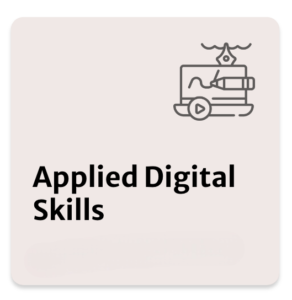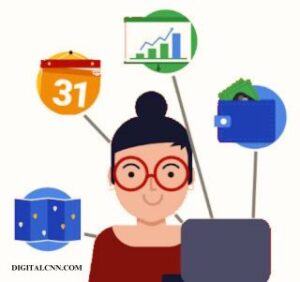In today’s rapidly evolving digital landscape, possessing applied digital skills is no longer optional; it’s essential. These skills enable individuals to effectively utilize digital tools and technologies to solve real-world problems, streamline workflows, and enhance productivity. As the demand for such competencies surges across industries, understanding their significance, benefits, and challenges becomes crucial for both employees and employers.
Table of Contents
ToggleUnderstanding Applied Digital Skills

Applied digital skills extend beyond basic computer literacy. They encompass the practical application of digital tools to perform tasks efficiently, adapt to new technologies, and innovate within one’s role. This includes proficiency in software applications, data analysis, digital communication, and understanding emerging technologies like artificial intelligence (AI) and machine learning.
The Importance of Applied Digital Skills in the Workplace
Enhanced Productivity: Employees equipped with digital skills can automate routine tasks, manage information more effectively, and collaborate seamlessly with colleagues, leading to increased efficiency.
Improved Employability: In an era where 90% of jobs require digital competencies, individuals with applied digital skills are more attractive to employers, enhancing their career prospects.
Adaptability to Technological Advancements: The digital landscape is ever-changing. Employees who continuously develop their digital skills can adapt to new tools and platforms, ensuring they remain relevant in their roles.
Innovation and Problem-Solving: Digital skills empower employees to leverage technology creatively, fostering innovation and effective problem-solving within organizations.
Benefits of Digital Skills

Enhanced Productivity: Proficiency in digital tools enables employees to automate routine tasks, manage projects more efficiently, and collaborate seamlessly with colleagues. This leads to increased productivity and allows teams to focus on strategic initiatives.
Improved Employability: Employers prioritize candidates with strong digital skills, as these are critical for navigating modern work environments. Individuals with applied digital skills are better positioned to secure employment and advance in their careers.
Innovation and Problem-Solving: Digital competencies empower individuals to leverage technology creatively, leading to innovative solutions and improved problem-solving capabilities. This is particularly valuable in industries undergoing digital transformation.
Global Collaboration: Digital skills facilitate communication and collaboration across geographical boundaries, enabling participation in the global economy and access to diverse markets.
Challenges in Developing Applied Digital Skills
While the benefits are clear, developing applied digital skills presents certain challenges:
- Access to Training: Not all individuals have access to quality digital education, leading to skill gaps in the workforce.
- Rapid Technological Changes: The fast pace of technological advancements can make it difficult for employees to keep their skills up to date.
- Digital Divide: Socio-economic factors can result in disparities in digital literacy, affecting employability and career progression.
Strategies for Developing Applied Digital Skills
Continuous Learning: Engaging in lifelong learning through online courses, workshops, and certifications helps individuals stay abreast of technological advancements.
Employer-Sponsored Training: Organizations can invest in employee development by providing access to digital skills training programs, fostering a culture of continuous improvement.
Integration into Education: Incorporating digital literacy into educational curricula ensures that future generations enter the workforce with the necessary skills.
Utilizing Free Resources: Platforms like Google’s Applied Digital Skills offer free courses to help individuals develop practical digital skills applicable in various contexts.
The Role of Applied Digital Skills in Artificial Intelligence
Artificial intelligence (AI) is becoming increasingly integrated into daily life and the workplace. Understanding AI and its applications is a crucial component of applied digital skills. Google’s “Discover AI in Daily Life” lesson, for instance, educates learners about the benefits and challenges of AI, providing hands-on experience with AI-driven tools like Quick, Draw!, AutoDraw, and Google Translate.
Conclusion
In conclusion, digital skills are indispensable in today’s digital-centric world. They enhance productivity, improve employability, and enable adaptability to technological changes. Despite challenges in access and rapid technological evolution, strategies like continuous learning, employer-sponsored training, and educational integration can bridge the skill gap. Embracing these skills not only benefits individuals but also contributes to organizational success and economic growth.
FAQs) about Applied Digital Skills
What are applied digital skills?
Applied digital skills refer to the practical use of digital tools and technologies to solve problems, complete tasks, and create efficiencies in personal and professional contexts. These include skills such as using software, managing online platforms, and analyzing data effectively.
Why are applied digital skills important?
In today’s digital economy, applied digital skills are essential for navigating technology-driven industries, enhancing productivity, and improving employability. They enable individuals to adapt to changing work environments, communicate effectively, and leverage innovation for problem-solving.
What are some examples of applied digital skills?
Examples include:
- Creating spreadsheets for data management.
- Using project management software like Trello or Asana.
- Conducting research using search engines and online databases.
- Designing presentations with tools like PowerPoint or Canva.
- Coding and programming for software development.
Who can benefit from learning applied digital skills?
Everyone, from students and job seekers to professionals and entrepreneurs, can benefit. These skills are applicable across industries, making them valuable for individuals in education, healthcare, business, technology, and more.
What resources are available to learn applied digital skills?
There are many resources available, including:
- Online platforms: Google’s Applied Digital Skills program, Coursera, LinkedIn Learning.
- Workshops: Local community or workplace training sessions.
- Free resources: YouTube tutorials, blogs, and free software trials.
What are the challenges in developing applied digital skills?
Some common challenges include:
- Limited access to technology or the internet.
- Keeping up with rapid technological advancements.
- Overcoming resistance to change in traditional workplaces.
- Lack of formal education or training opportunities.
